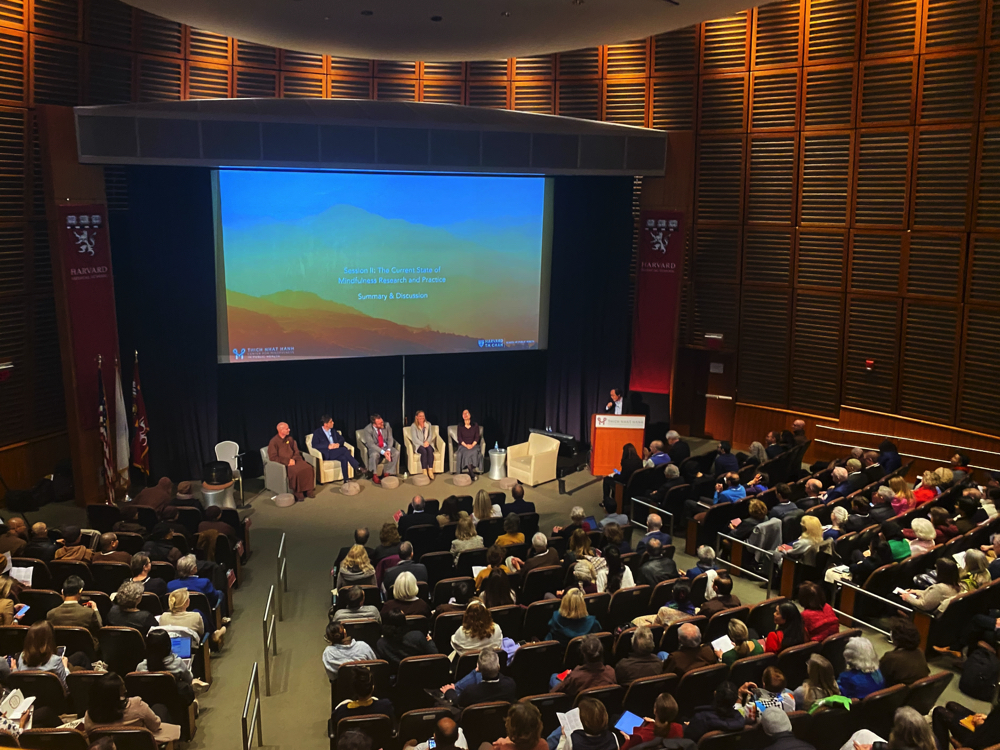On Wednesday, scientists and Buddhist monastics from around the world gathered to launch the Thich Nhat Hanh Center for Mindfulness in Public Health. Though the work of monks and researchers may seem very different, the symposium’s speakers shared similar visions for enhancing well-being. Mindful practice, the monks and scientists agreed, can help improve physical health.
The Hanh Center, endowed through an anonymous $25-million gift and based at the Harvard T.H. Chan School of Public Health (HSPH), plans to educate the public about mindfulness, and to pursue the evidence-based study of mindful practices, particularly those focused on nutrition and the environment. The program is named in honor of the recently-deceased Thich Nhat Hanh, a Vietnamese Zen Buddhist master who popularized the mindfulness movement.
During the past few decades, popular interest in mindfulness has boomed. In the public health sphere, researchers want to take the concept of mindfulness beyond solitary meditation and reflection (the way it is presented in dozens of popular apps). The Hanh Center asks how mindfulness—its connectivity, its awareness, and its intentionality—can be used to improve societal and global-scale health.

Frank Hu introduces a panel about current mindfulness research.
HSPH dean Michelle Williams said she believes mindfulness could supplement the costly interventions needed to address issues such as obesity, heart disease, and climate change. “Too often,” she said, “the science we try to bring forward to improve population health [is] constrained by costs or by logistical challenges. Neither of those limitations apply to mindfulness. The practice requires no specific tools or products. It is available to everyone everywhere.”
The Hanh Center has already announced several initiatives, including “Minding Our Future,” an interdisciplinary program helping people age healthfully, and “Eat, Move & Live Mindfully,” which teaches children healthy habits by focusing on nutrition, physical activity, and mindfulness.
Some practical aspects of mindful living have already been shown to translate well into clinical care. When Lilian Cheung, Director of Mindfulness Research and Practice in the school’s department of nutrition, attended a 1997 retreat with Hanh, she was struck by the practice of mindful eating. This exercise, which Wednesday’s symposium participants tried at lunch, involves eating slowly, carefully considering how much food you should eat, and creating a mental connection between your food and its path to your plate. “I could not get over the fact that my education never addressed mindful eating,” Cheung said. She went on to coauthor “Savor: Mindful Eating, Mindful Life” with Hanh in 2010.
Stare professor of nutrition and epidemiology Frank Hu said the new center will help educate the University and the public about mindful eating. He emphasized the alignment of the center’s goals and those of the department of nutrition (which he chairs), “to improve human health and the health of the planet through eating a healthy diet and practicing healthy lifestyles.”
Most of the symposium’s presenters were not affiliated with Harvard. This was by design, said professor of epidemiology and nutrition Walter Willett. “We organized this,” he said, wanting “to hear from people outside of our own group,” in order to develop “a wider perspective about what we might do in our research” that will “complement what other people are doing.” Many of the speakers, including those from established mindfulness centers at Brown and Oxford, shared how mindful practices can positively influence health.
The study of mindfulness-based individual health is centered around the idea that, when human minds are stressed, the body becomes stressed too, releasing a cascade of inflammation signals. “Chronic toxic stress,” said Vanderbilt psychologist David Vago, can lead to “persistent underlying inflammation,” “premature aging,” and, ultimately, “premature mortality.” Cultivating mindful habits, he said, can help lower patient stress levels and prevent downstream medical issues.
By changing behavior patterns, mindful practices can be longer-lasting than traditional remedies. Elissa Epel, a psychiatrist at the University of California, San Francisco, used mindfulness to help patients reduce stress-induced binge eating. Patients who integrated mindful eating into their routines lost more weight and maintained lower blood sugars than those who used traditional weight loss methods. “Emotional states shape metabolic states,” she said.
In science, mindfulness is not limited to established Buddhist practices. Alia Crum, a psychologist at Stanford, used the mindfulness philosophy of bodily awareness to change the way allergy immunotherapy trials are run. In the past, side effects of allergy immunotherapy (where patients ingest controlled amounts of their allergens to cure the allergy) were explained as an unfortunate, unavoidable inconvenience. Crum ran a randomized experiment in which she told half of the youth participants and their parents that side effects were actually their bodies fighting with the allergen and growing stronger. The kids who were told that side effects were a sign of success complained less about their symptoms and had better clinical outcomes. By understanding and utilizing “modern medicine’s most profound and powerful structure, the human mind,” Crum said, “mindfulness practices can also improve [patient] health by establishing and powering positive mindset change.
Eric Loucks, who directs Brown’s mindfulness center, discussed his group’s advocacy for health insurance coverage of Mindfulness-Based Stress Reduction (MBSR), whose benefits speakers throughout the day lauded. “There are many people… who are suffering from the ills of this moment—whether it is unhealthy diets, or overconsumption of alcohol or substances, or difficulties with emotion regulation,” said Loucks. “Mindfulness offers opportunities to heal these areas.”
Sara Lazar, a psychologist at Harvard Medical School, provided insight into existing efforts to quantify the benefits of mindfulness. In prior research, she scanned the brains of people who participated in an eight-week MBSR program and discovered that they exhibited increased gray matter structure in their posterior cingulate cortices, the brain region responsible for self-understanding. Recently, she conducted a similar study of veteran yogis and meditators, finding that they possess more connections in that region than a control group. “We think that this test will start to help us understand and quantify some of these really subtle but very powerful effects of a meditation practice.”
While researchers touted the results of their mindfulness-based care practices, many of the monks warned against isolating mindfulness as a standalone practice. Hanh, said Sister True Dedication, “shared that we should not take mindfulness out of the context of the Eightfold Path,” which couples mindfulness with concentration and introspection.
The monks also addressed the differences between a university-directed center and a monastic-directed center. Thay Phap An recalled his first six months as director of the European Institute of Applied Buddhism. For half a year before starting their studies, he explained lightheartedly, the group practiced “having a good time, because each of us comes from different communities, so we will learn to be together first.” Smiling, he suggested that Harvard’s new center “spend six months doing nothing,” to laughter from the audience. Still, there are lessons from Buddhist practice that the center can integrate. “What is the purpose,” he asked, “of providing public health if we do not have love in our hearts?”









